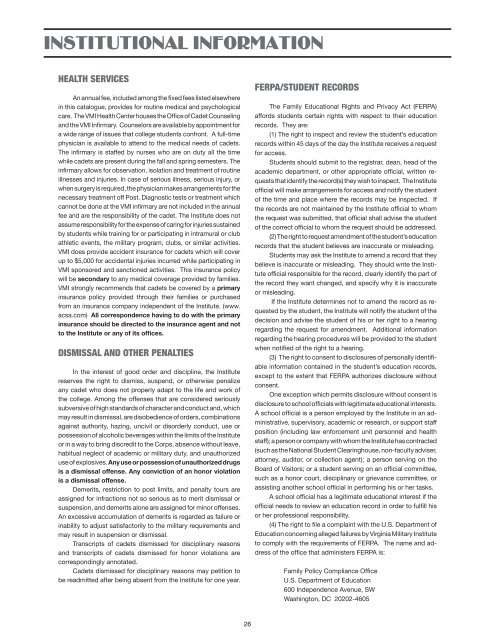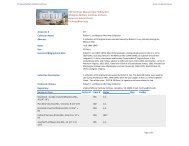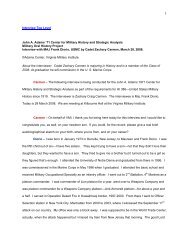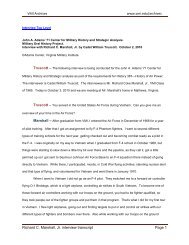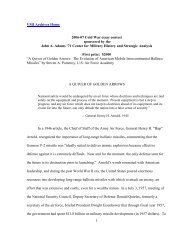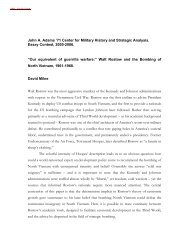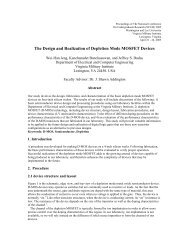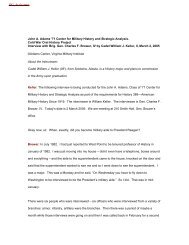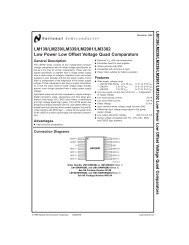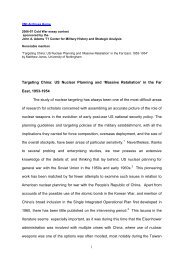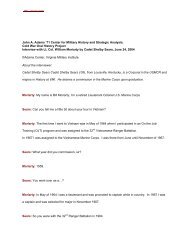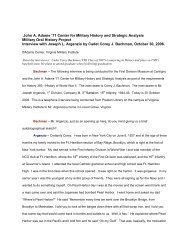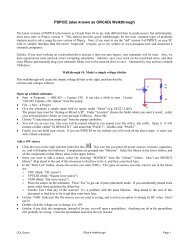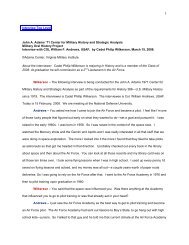Academic Catalog - Virginia Military Institute Admissions
Academic Catalog - Virginia Military Institute Admissions
Academic Catalog - Virginia Military Institute Admissions
You also want an ePaper? Increase the reach of your titles
YUMPU automatically turns print PDFs into web optimized ePapers that Google loves.
INSTITUTIONAL INFORMATION<br />
health SERVICES<br />
An annual fee, included among the fixed fees listed elsewhere<br />
in this catalogue, provides for routine medical and psychological<br />
care. The VMI Health Center houses the Office of Cadet Counseling<br />
and the VMI Infirmary. Counselors are available by appointment for<br />
a wide range of issues that college students confront. A full-time<br />
physician is available to attend to the medical needs of cadets.<br />
The infirmary is staffed by nurses who are on duty all the time<br />
while cadets are present during the fall and spring semesters. The<br />
infirmary allows for observation, isolation and treatment of routine<br />
illnesses and injuries. In case of serious illness, serious injury, or<br />
when surgery is required, the physician makes arrangements for the<br />
necessary treatment off Post. Diagnostic tests or treatment which<br />
cannot be done at the VMI infirmary are not included in the annual<br />
fee and are the responsibility of the cadet. The <strong>Institute</strong> does not<br />
assume responsibility for the expense of caring for injuries sustained<br />
by students while training for or participating in intramural or club<br />
athletic events, the military program, clubs, or similar activities.<br />
VMI does provide accident insurance for cadets which will cover<br />
up to $5,000 for accidental injuries incurred while participating in<br />
VMI sponsored and sanctioned activities. This insurance policy<br />
will be secondary to any medical coverage provided by families.<br />
VMI strongly recommends that cadets be covered by a primary<br />
insurance policy provided through their families or purchased<br />
from an insurance company independent of the <strong>Institute</strong>. (www.<br />
acsa.com) All correspondence having to do with the primary<br />
insurance should be directed to the insurance agent and not<br />
to the <strong>Institute</strong> or any of its offices.<br />
DISMISSAL AND OTHER PENALTIES<br />
In the interest of good order and discipline, the <strong>Institute</strong><br />
reserves the right to dismiss, suspend, or otherwise penalize<br />
any cadet who does not properly adapt to the life and work of<br />
the college. Among the offenses that are considered seriously<br />
subversive of high standards of character and conduct and, which<br />
may result in dismissal, are disobedience of orders, combinations<br />
against authority, hazing, uncivil or disorderly conduct, use or<br />
possession of alcoholic beverages within the limits of the <strong>Institute</strong><br />
or in a way to bring discredit to the Corps, absence without leave,<br />
habitual neglect of academic or military duty, and unauthorized<br />
use of explosives. Any use or possession of unauthorized drugs<br />
is a dismissal offense. Any conviction of an honor violation<br />
is a dismissal offense.<br />
Demerits, restriction to post limits, and penalty tours are<br />
assigned for infractions not so serious as to merit dismissal or<br />
suspension, and demerits alone are assigned for minor offenses.<br />
An excessive accumulation of demerits is regarded as failure or<br />
inability to adjust satisfactorily to the military requirements and<br />
may result in suspension or dismissal.<br />
Transcripts of cadets dismissed for disciplinary reasons<br />
and transcripts of cadets dismissed for honor violations are<br />
correspondingly annotated.<br />
Cadets dismissed for disciplinary reasons may petition to<br />
be readmitted after being absent from the <strong>Institute</strong> for one year.<br />
FERPA/Student Records<br />
The Family Educational Rights and Privacy Act (FERPA)<br />
affords students certain rights with respect to their education<br />
records. They are:<br />
(1) The right to inspect and review the student’s education<br />
records within 45 days of the day the <strong>Institute</strong> receives a request<br />
for access.<br />
Students should submit to the registrar, dean, head of the<br />
academic department, or other appropriate official, written requests<br />
that identify the record(s) they wish to inspect. The <strong>Institute</strong><br />
official will make arrangements for access and notify the student<br />
of the time and place where the records may be inspected. If<br />
the records are not maintained by the <strong>Institute</strong> official to whom<br />
the request was submitted, that official shall advise the student<br />
of the correct official to whom the request should be addressed.<br />
(2) The right to request amendment of the student’s education<br />
records that the student believes are inaccurate or misleading.<br />
Students may ask the <strong>Institute</strong> to amend a record that they<br />
believe is inaccurate or misleading. They should write the <strong>Institute</strong><br />
official responsible for the record, clearly identify the part of<br />
the record they want changed, and specify why it is inaccurate<br />
or misleading.<br />
If the <strong>Institute</strong> determines not to amend the record as requested<br />
by the student, the <strong>Institute</strong> will notify the student of the<br />
decision and advise the student of his or her right to a hearing<br />
regarding the request for amendment. Additional information<br />
regarding the hearing procedures will be provided to the student<br />
when notified of the right to a hearing.<br />
(3) The right to consent to disclosures of personally identifiable<br />
information contained in the student’s education records,<br />
except to the extent that FERPA authorizes disclosure without<br />
consent.<br />
One exception which permits disclosure without consent is<br />
disclosure to school officials with legitimate educational interests.<br />
A school official is a person employed by the <strong>Institute</strong> in an administrative,<br />
supervisory, academic or research, or support staff<br />
position (including law enforcement unit personnel and health<br />
staff); a person or company with whom the <strong>Institute</strong> has contracted<br />
(such as the National Student Clearinghouse, non-faculty adviser,<br />
attorney, auditor, or collection agent); a person serving on the<br />
Board of Visitors; or a student serving on an official committee,<br />
such as a honor court, disciplinary or grievance committee, or<br />
assisting another school official in performing his or her tasks.<br />
A school official has a legitimate educational interest if the<br />
official needs to review an education record in order to fulfill his<br />
or her professional responsibility.<br />
(4) The right to file a complaint with the U.S. Department of<br />
Education concerning alleged failures by <strong>Virginia</strong> <strong>Military</strong> <strong>Institute</strong><br />
to comply with the requirements of FERPA. The name and address<br />
of the office that administers FERPA is:<br />
Family Policy Compliance Office<br />
U.S. Department of Education<br />
600 Independence Avenue, SW<br />
Washington, DC 20202-4605<br />
26


